Justice

THE SEASON OF Advent is over, but the season of our waiting is not. There is still so much we long to see brought to fruition. Every morning’s news confirms the ache. We are pining for so much to be made right in a world that has gone so wrong. Christmas may have marked the end of Advent, but the liturgical year has only just begun. In other words, Christ has been born, but there is still a lot of story to be played out. What a great reminder as we head into yet another year that looks bleak at the outset: This story we are living in isn’t done yet. There is more to come, and some of it is very good news.
Just as it will take time for the Christ child to grow into the savior the world needs him to be, in every era of human history, the growth of justice takes time. Recognizing the slow pace at which the kin-dom of God unfolds does not mean we lie down on our backs and abdicate responsibility, but it does mean we have hope as we both labor and rest. No matter how dismal it may look out there, justice is on its way.
January’s readings take us into conversation with texts aching for justice and longing for homecoming, helping us sense when to listen and when to speak, when to hold still and when to move. We are encouraged to be tender with each other as we wait, to hold on tight to hope, and when the moment calls, to act with conviction.

IF YOU'VE SPENT some time in church, you’ve likely heard a sermon on Jesus’ instruction, “Do not worry.” But how do we actually do that? Can we actually do that? In Nervous Systems, author Sara Billups grapples with “the dissonance between the head reading ‘do not worry’ and the heart worrying.” And while Billups seeks to align her head and heart, she does not claim to have found a spirituality that magically dispels anxiety. “My anxiety did not dissipate,” she writes. “Instead, God met me repeatedly in its very presence.”
With a mix of memoir and critical reflection, Billups explores how God meets us wherever anxiety dwells—in the human body, the church body, and the body politic. Billups, who has a doctor of ministry in the “sacred art of writing,” relies on both research and personal experience to guide her. She weaves in her exploration of Ignatian spiritual practices as a tangible way to seek God’s steadfast presence in anxious times. Reflecting with candor on her anxieties around health, aging parents, motherhood, church, and politics, she captures the nuance that Christian discussions of anxiety—the ones that might boil down to “just pray more” or “trust God more”—often miss.
I appreciate Billups’ emphasis on being “faithful and present” in our lives, relationships, faith communities, and world. For her, fidelity and stability are spiritual practices. In a time when “our anxiety manifests acutely in political polarization,” as Billups writes, we need a spirituality that grounds us. We need a faith that reduces our defensiveness and pushes us to engage with diverse communities out of a desire to love, rather than a need to control. “Political anxiety is stoked,” Billups writes, “when we are not well-formed and spiritually mature.”

CALLIE WALKER GREW up in central Virginia, where her father farmed cattle on land he’d purchased in the 1960s. Walker, 56, with bright blue eyes and a shock of salt-and-pepper hair, doesn’t know how much land her father originally owned. “It was certainly hundreds of acres,” she said, “and it may have been thousands.”
He spent 30 years paying it off, Walker told me, and succeeded, largely, by selling off a parcel of land here or there to pay the bills. When Walker’s father died in 2014, at 91, he left his three children portions of the remaining acreage; Walker’s inheritance — green, rolling farmland unfurling on either side of a small country road — totaled 134 acres.
Walker attended Princeton Theological Seminary and spent years living communally and working for racial justice. She had known since the 1990s that she wanted to use the property she would one day inherit for some kind of intentional community.
By January 2020, Walker’s intentions for the land clarified: She wanted to give it away.
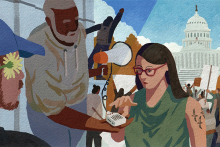
A DELIGHTFUL DISCOVERY I made while researching a countercultural Christian community in Washington, D.C., was the book Gifts of Grace by Mary R. Schramm. In 1965, Mary and her husband, John, started the Community of Christ. The community intentionally wove together a deepening faith, activism for peace and justice, and shared life with other Christians from the raw starting material of honoring each person’s unique contribution. Discerning each one’s gifts was a way of learning about God’s will for their lives, individually and collectively. “I don’t care whether you’re 8 or 80,” Schramm wrote, “you are responsible for finding out the things that God would have you do.” To do that, she encouraged paying attention to what one enjoys. “I don’t think God gave you a gift or an ability to make you miserable,” Schramm said in a talk about her book. “God made us to be fulfilled by the gifts that God gave us.”
The idea of “being called” by God can be intimidating. It can also be misused — for example, when someone is convinced that they should determine what your calling is or is not, or when someone erects barriers to exclude the callings of others. An intimation of God’s call can also spur feelings of self-doubt or unworthiness, as it did initially for the prophets Isaiah and Jeremiah. Yet, in their stories we see a God who chooses individuals and calls them amid their struggles. What might be perceived as a weakness can be turned into a strength through the gift of God’s grace. Imagine! A God who wants us just as we are.

When Ryan Medina stepped off the plane in San Salvador, capital city of El Salvador, he felt the thrill of being in a new country. He was eager to meet the fellow pilgrims he’d only known online and excited about the journey ahead. But as their van left the bustling city streets and began the drive to the gravesite of four U.S. churchwomen, the atmosphere shifted.
“I realized we were quite literally retracing the same route these women took after they were picked up from the airport on the night they were ambushed and killed,” said Medina, a teacher at Loyola Blakefield High School near Baltimore, Md.

Ruth Padilla DeBorst told her audience: “There is no room for indifference toward all who are suffering the scourge of war and violence the world round, the uprooted and beleaguered people of Gaza, the hostages held by both Israel and Hamas and their families, the threatened Palestinians in their own territories, all who are mourning the loss of loved ones.”
Less than 48 hours later, the director of the Fourth Lausanne Congress emailed all attendees, issuing a lengthy apology for Padilla DeBorst’s speech.

In the quiet oratory of Holy Wisdom Monastery in Middleton, Wisc., I spent my mornings gazing at the face of Jesus. On the far wall of the room where we prayed hung an icon of Jesus holding a tablet that read, “Behold, I make all things new.” Outside the prairie was a technicolor parade of coneflowers, whorled milkweed, and purple loosestrife, while robins, cardinals, and song sparrows continued their song; but it was hard for me to believe that Christ was making things new in the present.

Like any other Gen Zer, I’ve grown up hearing about the potential harms of social media: As early as elementary school, teachers and parents warned us of stranger danger, not just in the grocery store, but also online. I was 12 when I got my first social media account on Instagram (even though my hand-me-down iPod Touch didn’t have a camera). In seventh grade, I, and many of my classmates, wrote our final essays for English class on the influence of social media on teenage girls’ body image. I was in junior high when news broke that Facebook user data had been improperly harvested to manipulate U.S. voters. In my high school’s speech and debate club, I learned about dangers of doxxing — posting people’s personal information, like addresses, online as a way to target them for violence. And in my own work here at Sojourners, I regularly see the hate and homophobia that shows up in social media comments.

At their strongest, films and TV shows can help us pay attention to — and by extension, love — the people and the world around us.

“We had a prayer meeting [Monday] morning with dozens and dozens of people from all different traditions, from bishops to people sitting in the pews,” Cannon told Sojourners. “We’ll have another prayer gathering on Wednesday morning. We’re grieving, we’re lamenting, and we’re also working really hard.”

“They will not hurt or destroy on all my holy mountain...” —Isaiah 11:9

IN 1991, FOUR Los Angeles police officers beat Rodney King, a 25-year-old African American man, nearly to death. It was caught on video. All the officers were acquitted of assault with a deadly weapon. The acquittals were followed by six days of rebellion with more than 50 associated deaths. At that time, I and many other white Christians fixated on our desire to see “peace” restored. Even in the face of graphic police brutality, I was unable to see the pernicious racial injustice that created the context for the riots. The white Christianity of my upbringing did not equip me with a biblical lens through which to discern the truth about racial injustice in the U.S. It would be nearly a full decade before I could finally begin to perceive it.
Nevertheless, in light of the role white Christian nationalists played in the Jan.6 riot, the number of pastors who preach against Black Lives Matter and critical race theory, and the deafening silence and stubborn inaction of many white Christians in the face of explicit cries for racial justice, I have to ask: Will this generation of white American Christians be just another in the long line to embolden racial injustice?
Where do we turn to find hope, inspiration, and guidance to help white Christians finally commit to our God-given vocation to do justice instead of holding tightly to our idolatrous commitment to white supremacy? I look to the little-known biblical prophet Zechariah and how he called a generation returned from exile to live out God’s call to do justice.
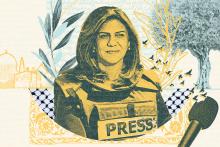
PALESTINIAN AMERICAN JOURNALIST Shireen Abu Akleh was shot and killed in May 2022 while covering an Israel Defense Forces raid on a refugee camp in the Palestinian West Bank village of Jenin. Abu Akleh had been standing with a group of other journalists and was wearing a blue vest with the word PRESS printed across it when she was shot; her producer was shot in the back but survived. Hours after Abu Akleh’s death, Israeli police went into her home, took away Palestinian flags, and prevented the singing of Palestinian nationalist songs.
In mid-November, the FBI opened an investigation into Abu Akleh’s death; Israeli Defense Minister Benny Gantz said Israel would refuse to cooperate since, Gantz said, the IDF had already investigated the IDF actions in the shooting. The U.S. State Department commented, “Not only was Shireen an American citizen, she was a fearless reporter whose journalism and pursuit of truth earned her the respect of audiences around the world.”
Before her death, households throughout the Arab world knew Abu Akleh’s work. Nicknamed “the daughter of Palestine” — and “the voice of Palestine” — Abu Akleh had worked for Qatar-based news outlet Al Jazeera for a quarter century. Viewed as courageous and thoughtful, Abu Akleh inspired many, including women interested in pursuing a career in journalism in the Middle East. A common signoff for her broadcasts summarized her motivation for being a journalist: “I chose journalism to be close to people. It might not be easy to change the reality, but at least I can bring their voices to the world. I am Shireen Abu Akleh.”
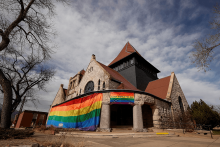
Thom Andreas was a gay Christian kid in the 1990s when his hometown of Colorado Springs, Co. was becoming known as the “evangelical mecca” or “evangelical Vatican.” And this gave Andreas a front-row seat as the movement advocated against LGBTQ rights and dignity in politics and faith.
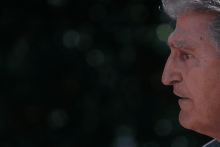
Three weeks ago, it seemed impossible that this Congress and this president would be able to get anything significant and lasting done to confront climate change. But this week, President Joe Biden signed major climate legislation — the Inflation Reduction Act — into law. It’s a bittersweet moment.
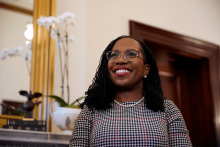
Ketanji Brown Jackson was confirmed by the Senate on Thursday as the first Black woman to serve on the Supreme Court in a milestone for the United States and a victory for President Joe Biden, who made good on a campaign promise as he seeks to infuse the federal judiciary with a broader range of backgrounds.

Hawley's accusation that Jackson is soft on crime reveals a troubling perspective on people who enact harm. Hawley is one of several Republican senators who sorts the world into two types of people: People who are evil and, if given the chance, will commit horrific, reprehensible crimes over and over again, and people like the rest of us, people who need to be protected from the evil people. According to this line of thinking, ensuring this protection shouldn’t rule out the harshest measures of isolation and punishment the state can enact. We separate “them” from “us” by forever marking them as dangerous.

In Genesis 2, after spending six days forming the earth, God rests “from all the work,” setting a sacred precedent. In Exodus 20:8-10, God instructs the Israelites to embrace patterns of rest. In Matthew 8:23-26, Jesus rests in a boat during a torrential downpour, despite tides rising and crashing against the boat’s hull, threatening to capsize the passengers. We can take comfort in this: If the son of God needed to take a break every now and then, so do we.
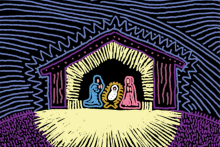
At its core, the Christmas story is radical. Christ enters the world in the form of a marginalized infant — a story about finding hope amid brokenness by pushing forward into the darkness. We cannot find the true light of Christmas without understanding what it means to be in the dark, opening our eyes to the injustices in our neighborhoods.
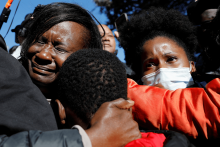
A jury in Brunswick, Ga., found all three defendants guilty of murder Wednesday for chasing and killing Ahmaud Arbery while he was out on a run in February 2020. Faith leaders across the country showed gratitude for the verdict while noting the grief for Arbery’s family and the work of justice still to be done.